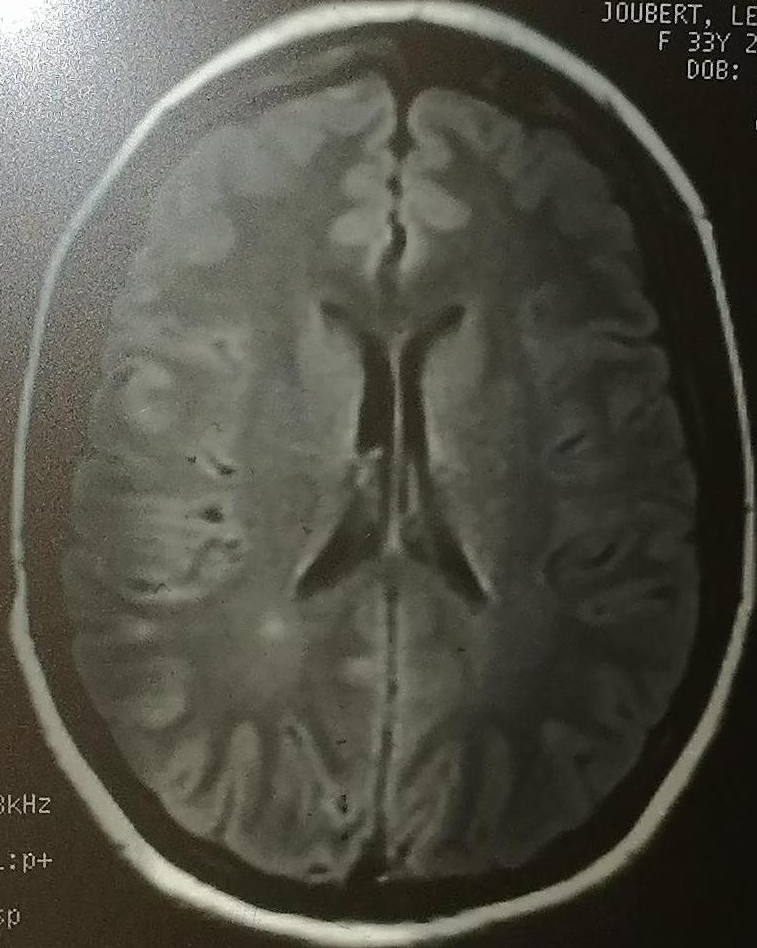A little dot on the brain?

November 2023 was a month that will forever be etched in my memory. It was a time when I experienced a strange and severe headache that left me feeling dizzy and unwell for an entire week. This particular day started like any other, but it quickly turned into a nightmare I could never have anticipated.Throughout the week, I noticed my heart rate was unusually low, hovering around 45 beats per minute. On the day of the incident, I was already feeling out of sorts. The headache, which had been a dull throb, suddenly escalated to an unbearable level. Chest pain accompanied this sudden increase in pain, and I felt an overwhelming sense of dread. I decided to lie down, hoping to find some relief.
As I lay there, the pain intensified to a point where I felt like I was dying. My left hand spasmed and closed involuntarily, and for a few terrifying seconds, I thought my head would explode. My watch indicated a pulse in the low 40s, and the combined pain in my chest and head was excruciating. Then, just as suddenly as it began, the pain subsided. I was left feeling strangely fine, without a headache and better than I had felt all week.
However, this brief respite was short-lived. Later in the week, I noticed my cognitive functioning was off. I became more forgetful and disoriented, and the headaches returned along with dizziness. Concerned for my health, I went to the hospital. Unfortunately, my symptoms were dismissed as anxiety. I underwent an MRI and an EEG, but the neurologist found nothing abnormal. They assured me everything was normal, but I couldn't shake the feeling that something was wrong.When I reviewed the MRI myself, I noticed a small white spot on my brain, described as a single hyperintensity in the right parieto-occipital area. The doctors considered it an insignificant finding, but to me, it was a glaring indication that something was amiss. Despite my insistence that this specific incident was not a mere bout of anxiety, my concerns were not taken seriously.
Months later, after visiting one specialist after another, I finally found doctors who listened. They reviewed the MRI and acknowledged the strange changes in my brain. They recommended further tests to rule out Multiple Sclerosis (MS). Additionally, they discovered I had elevated hematocrit levels, posing a significant blood clot risk. To mitigate this, I was placed on blood thinners (Clexane), which I needed to inject to lower my counts. Along with high hematocrit, I also had elevated haemoglobin, red blood cells, and white blood cells. Several months after this experience, I am just starting to feel like my old self. The brain fog and strange forgetfulness I was experiencing daily are beginning to lift. While I still struggle to remember things, the improvement in my cognition is noticeable. Fortunately, MS was ruled out after undergoing muscle testing and a spinal tap, which I would not recommend to my worst enemy.
My experience with both tests was far from fantastic—the spinal tap was intense, and for ten days afterwards, I could barely stand up as my head felt like it would fall off. It might sound strange, but it felt like my brain would slide down. Even though all the tests indicated everything was normal, I knew something had changed that day. This experience has been incredibly frustrating and frightening. It serves as a reminder of the often dismissive attitude towards patients with unexplained symptoms. Advocating for oneself and seeking answers is crucial, even when medical professionals might not take our concerns seriously. My journey with chronic illness and undiagnosed conditions continues, but each experience, no matter how terrifying, strengthens my resolve to find answers and live a life defined not by my illnesses but by my resilience and determination.